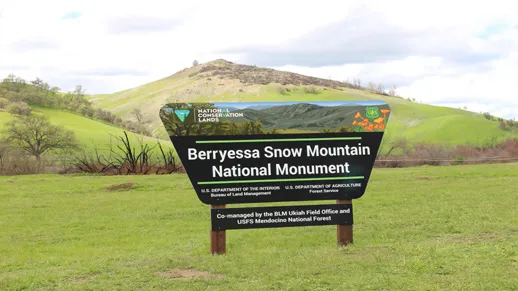President Joe Biden has signed a proclamation expanding the Berryessa Snow Mountain National Monument, the White House announced this week.
In a statement Thursday, the White House said the expansion, which was authorized by Biden under the Antiquities Act, honors “Tribal Nations and Indigenous peoples through the protection of this sacred California landscape and its historically and biologically important features, while conserving our public lands and growing America’s outdoor recreation economy.”
The Berryessa Snow Mountain National Monument consists of around 330,000 acres of the California Coast Ranges in Napa, Yolo, Solano, Lake, Colusa, Glenn and Mendocino counties.
“The expansion will add 13,696 acres of public lands, managed by the Department of the Interior, to the monument’s original 330,000 acres, which are jointly managed by the Bureau of Land Management and the U.S Forest Service,” the statement read.
The signed proclamation also renames a ridgeline outside the boundary of the existing monument, previously known as “Walker Ridge.” It will be named “Molok Loyuk,” which means “Condor Ridge” in the language of the Patwin people.
“To further honor the ties of the Patwin people to these lands, the President’s proclamation also directs the Secretary of the Interior to explore co-stewardship of the area with Tribal Nations,” the White House said.
Under the proclamation, the Bureau of Land Management is mandated to manage the newly expanded monument based on the same terms, conditions, and management as the original monument designation. The bureau is also directed to include the expansion area in the plan for the entire monument and to issue a travel management plan.
‘Win-win actions’
California Natural Resources Secretary Wade Crowfoot said the expansion “protects two very special places in California for future generations.”
“These monument expansions, combined with the establishment of new proposed monuments in California currently under consideration, are win-win actions that benefit California’s people and nature alike. They will help us conserve 30 percent of California’s lands by 2030, protect sacred cultural sites, and enshrine access to our public lands,” Crowfoot said.
Yocha Dehe tribal chairman Anthony Roberts expressed his gratitude, noting that Molok Luyuk is an area “steeped in thousands of years of rich history and profound meaning to the Patwin people, whose traditional territory stretches south from these hills to the shores of San Pablo Bay and east to the Sacramento River.”
“Elements of the natural landscape on the ridge have traditional cultural significance to us. We look forward to the day when condors fly over Molok Luyuk once again,” he said.
Besides the Berryessa Snow Mountain National Monument, Biden also approved the expansion of the San Gabriel Mountains National Monument, which consists parts of the Angeles National Forest and the San Bernardino National Forest.
The White House clarified that the expansions only reserve federal lands and do not affect the property rights of state or private land owners.
“Any existing state or private lands within the boundaries are not included in the monuments,” it said.
Mary Creasman, CEO of California Environmental Voters, welcomed the expansions while urging the Biden administration to look to additional places in California for national monument designation so the U.S. can make more progress towards 30×30, which is a worldwide initiative for governments to designate 30 percent of Earth’s land and ocean area as protected areas by 2030.
“The expansion of our national monuments and protection of our public lands are key nature-based solutions to the climate and biodiversity crises,” she said.
The post Biden signs expansion of Berryessa Snow Mountain Nat’l Monument, honoring tribes appeared first on Local News Matters.
